
How to Create an Affiliate Marketing Agreement (Free Template)
Learn how to protect your business and ensure affiliates follow your affiliate marketing rules.
How to Create an Affiliate Marketing Agreement (Free Template)
Entering an affiliate partnership requires clear and well-defined terms and conditions. You must define a clear affiliate marketing strategy that matches your business goals and effectively communicate them with your affiliates.
An essential part of this partnership is an affiliate marketing agreement. Take note that this agreement should not be entered into lightly. It lists all the terms and conditions of the partnership so your program will run smoothly. Here’s what you need to know to craft an affiliate agreement suited to your business.
What Is an Affiliate Marketing Agreement?
An affiliate marketing agreement is the document merchants and affiliates sign to officialise their affiliate partnership. It describes the terms and conditions of the working relationship.
The agreement may be signed between a brand and an individual or a brand and a company. To have a solid and fruitful partnership, the agreement must include all rights and obligations that both parties are bound by.
What Is Included in an Affiliate Marketing Agreement?
Every agreement has two parts: a legal and a financial part. Yes, the agreement itself is a legally binding document, but the legal part includes items related to the brand. Intellectual property rights, privacy policies, content standards, disclaimers, and brand requirements are just a few legal matters. The second or financial part includes the commission rate, commission requirements, disqualifications, and the payment schedule.
Affiliate agreements consist of several parts, each defining the item in question. Every business is unique, so using in-house legal software or working with a legal professional can help you craft the best affiliate marketing agreement for your situation. Read on to expedite the process with our template.
Get Your Affiliate Marketing Template for Free
To guide you on how to craft your affiliate marketing agreement, you can copy this template. It contains questions to help you draft the contents of each section as described below. Answering these questions will help you create a personalised agreement that a lawyer can turn into a legally binding agreement.
Since jurisdictions are bound by different and specific laws, consulting a lawyer will ensure your document covers all applicable laws in your state. You can also view the full template in action by looking at Trackdesk’s affiliate agreement.
The Anatomy of an Affiliate Marketing Agreement
An affiliate marketing agreement is a legal document like any other agreement and comprises several parts. This includes defining the terminology, the working relationship, rights and obligations, and much more. Let's take a look at each section more closely, demonstrating specifics on the agreement we use with our own affiliates.
Introduction
A forward introduction explains the agreement's purpose and a short overview of the merchant’s intentions. This should be clear and concise to avoid possible misunderstandings between the parties.
It should also contain the business details of the merchant and provide a short definition of terms to clarify what certain words refer to. For instance, in Trackdesk’s introduction, we defined the company as the “Operator” and the affiliate as the “Partner.”
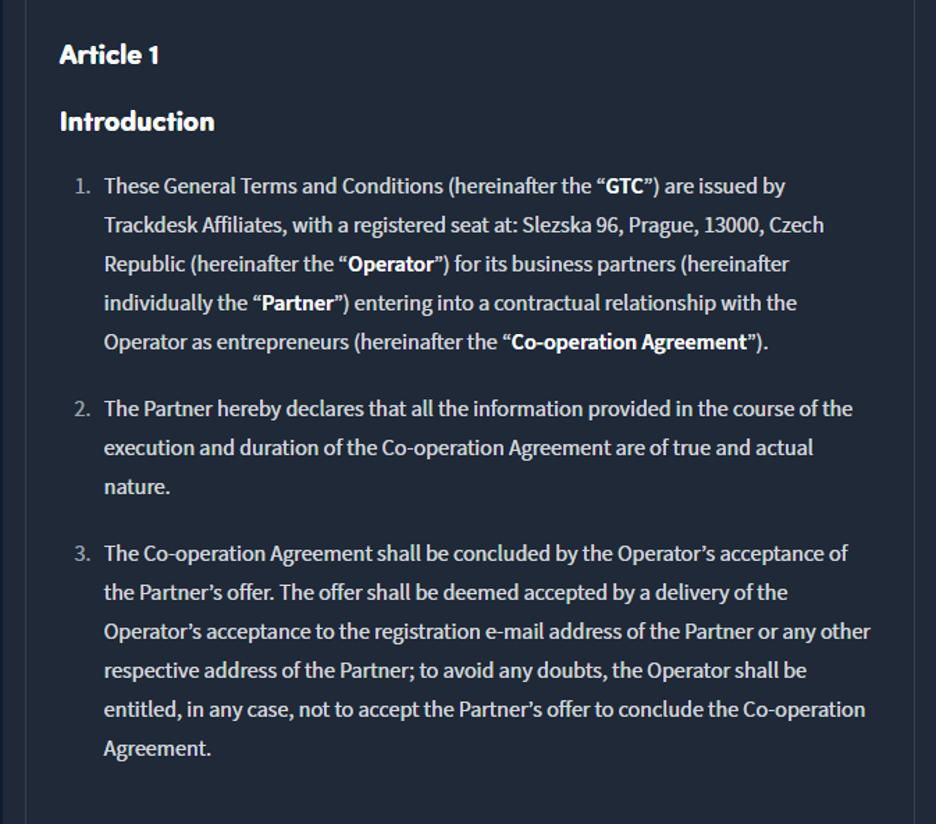
Nature of the Partnership
Be sure to define the nature of the partnership between your brand and the affiliate. Clearly define the affiliate’s role describing that it’s not an employment relationship but that of an independent contractor.
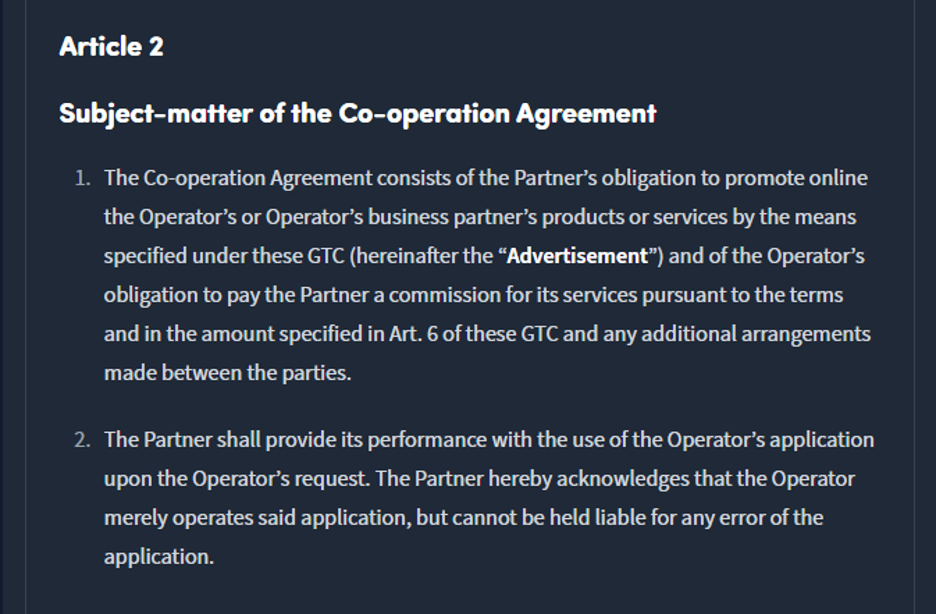
Confidentiality Agreement
Confidentiality agreements are a must in almost all types of business but are especially important in affiliate marketing. Affiliates work with a large audience, and leaking confidential information is possible.
Ensure confidentiality by strictly defining proprietary information like suppliers' information, customer lists, upcoming products, marketing strategies, etc. Secure the confidentiality of your information, or they might end up with your competitor once you end up on the affiliate's wrong side.
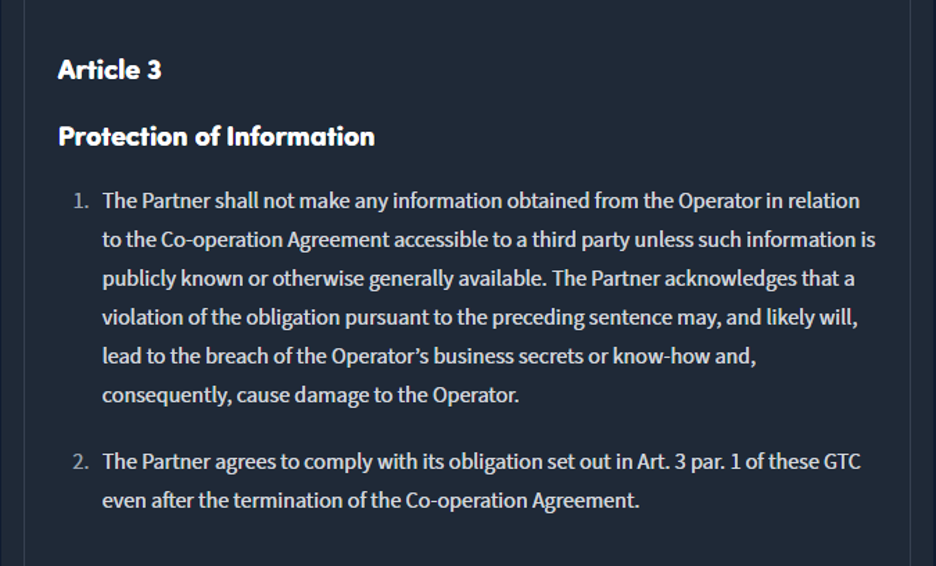
Rights and Obligations
Putting the responsibilities of all involved parties on paper will help avoid any misunderstanding later on. This part should include the rights and obligations of both affiliates and merchants, although some merchants practise leaving out the part about their responsibilities.
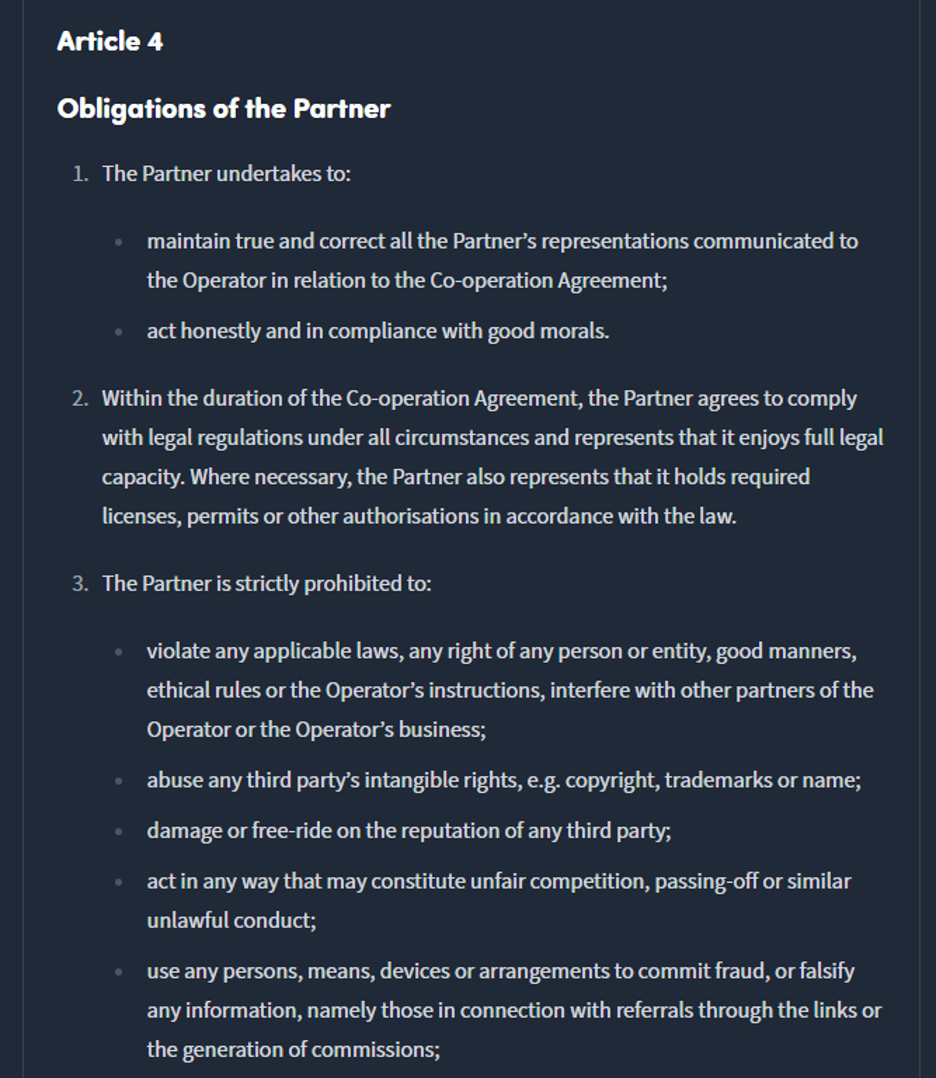
When specifying the obligations of your affiliates, include the items that they’re prohibited from doing. Be as detailed as possible to avoid misunderstandings. You can also include the penalty for breaching the contract. Utilizing a digital contract builder can streamline the process of outlining these obligations and penalties, ensuring clarity and ease of use.
Promotion
Affiliates may uplift or break the brand reputation that you are trying so hard to build. Unless the marketing practices are clearly defined, the affiliates have a blank card to choose the promotional methods they see fit to generate sales and earn a commission.
These methods may include misleading information, false leads, or promises of rewards that clients will never get. Identify each aspect of promotional marketing and create strict rules on what you accept or reject concerning marketing promotion.
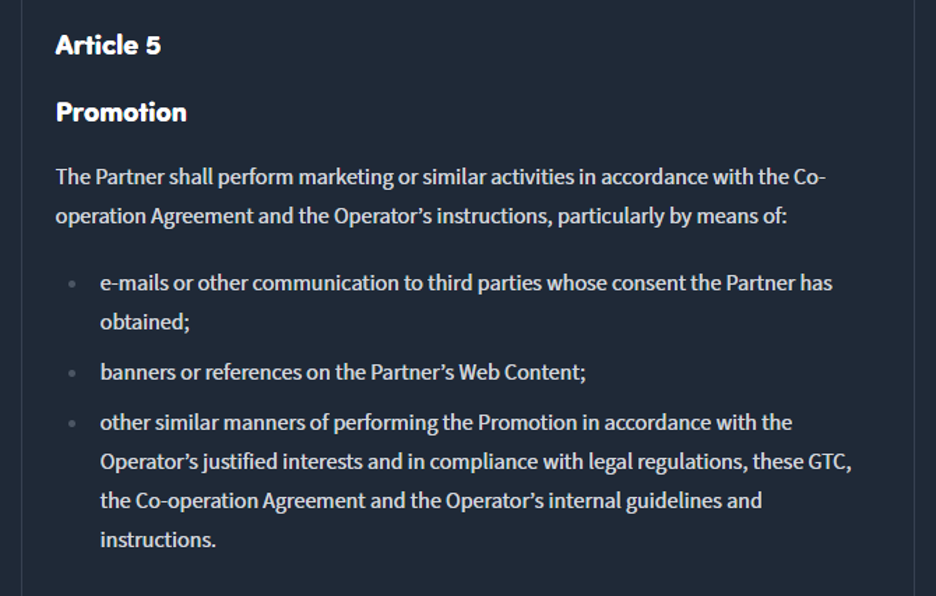
The following should be included in the agreement along with the clearly defined principles of behaviour:
- Content creation and use;
- Video creation and use;
- Coupons and discounts;
- Link promotions;
- Incentivised traffic;
- Use of mobile apps;
- Paid search campaigns;
- Other types of behaviour.
Payment and Commission
The most important part of the affiliate agreement—and probably the most read part—is the Payment and Commission section. After successfully recruiting affiliates to your affiliate marketing program, they’d read this part to learn about the details of your commission rates. You can mention the rates upfront during the introduction, but reserve the nitty gritty details for this part.
This section covers how much they can expect to earn and how they’ll receive that payment. It also guides affiliates on how to promote your product since this section describes cases when a purchase becomes disqualified from earning a commission. Remember to be precise and transparent when drafting this part.
This section must cover:
- Commission eligibility requirements
- Commission rates and tiers
- Payout requirements
- Duration of affiliate links
- Ineligibility conditions
You should describe the above items in detail so there’s no room for misinterpretations. To help you formulate an attractive commission structure, you can use our guide on creating compelling commission tiers.
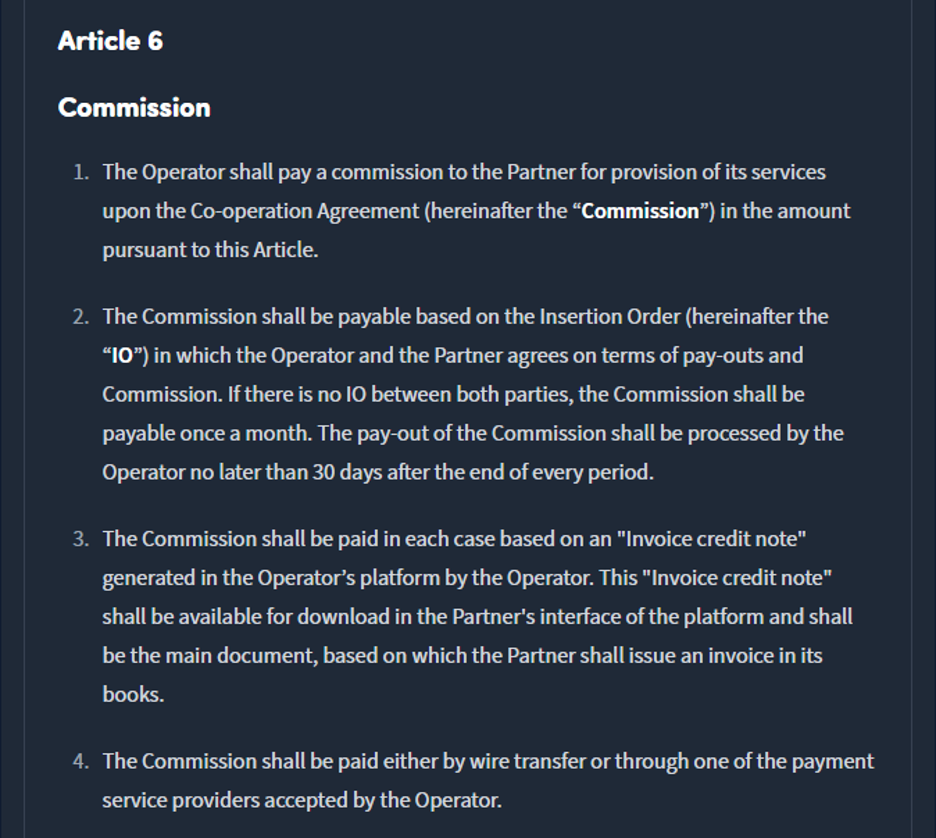
Other Arrangements (Liability, Indemnification, and Disclaimer)
This section can list all the cases where you won’t be held liable and where the affiliate will indemnify you against losses. Include a liability clause to define liability limits and protect you against loss of data, revenue, and profits. You should also use an indemnification clause to protect your brand from any affiliate’s misrepresentation or breach of agreement.
Additionally, you can use this section to clearly explain that there are no implied warranties and representations regarding the affiliate program and products or services sold. You can also include a remedies clause to protect you from any affiliates who violate the agreement. You can demand compensation for damages plus termination of the agreement. Furthermore, ensure your business is registered as a separate legal entity to safeguard your assets from litigation arising from the affiliate's actions or breaches. This ensures comprehensive protection for your business in all potential scenarios.
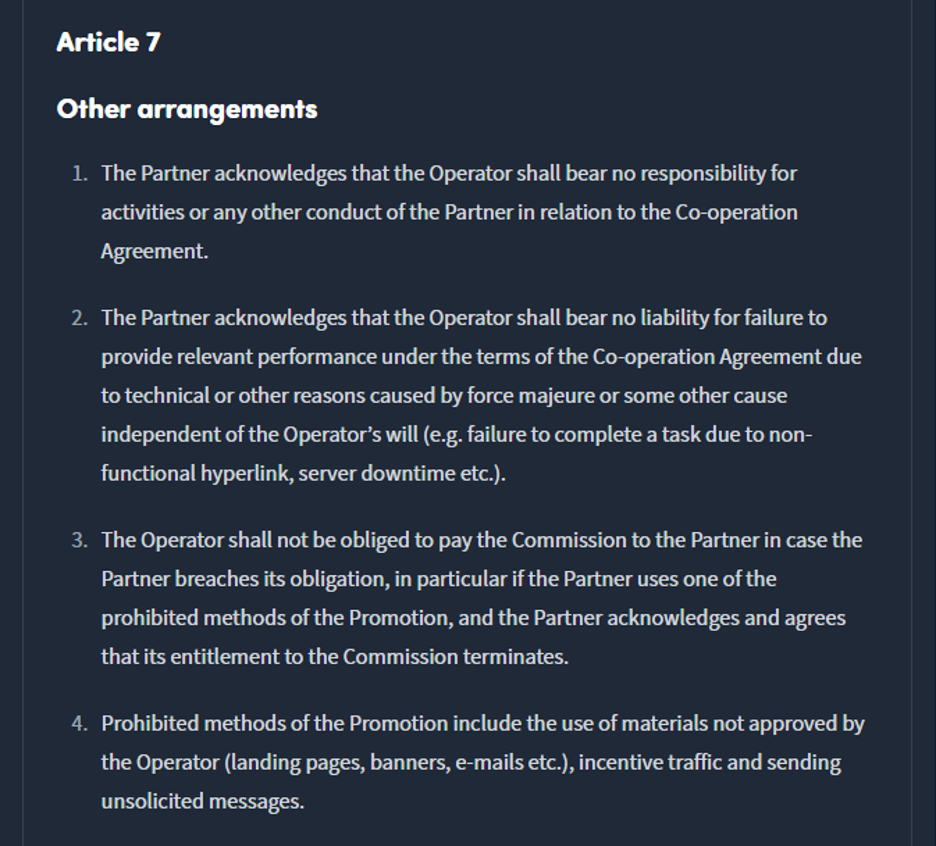
Communication
A crucial part of your affiliate agreement is defining the communication methods and obligations between you and your affiliates. List down the official communication channels where any exchanged information can be considered legally binding.
Provide in detail the instances when an affiliate is required to communicate with the brand, such as when there’s a change in contact details or when the affiliate is unable to perform their obligations. You should also mention that as the brand, you have the right to constantly evaluate the affiliate’s legal identity at any time during the partnership. This includes requesting personal documents.
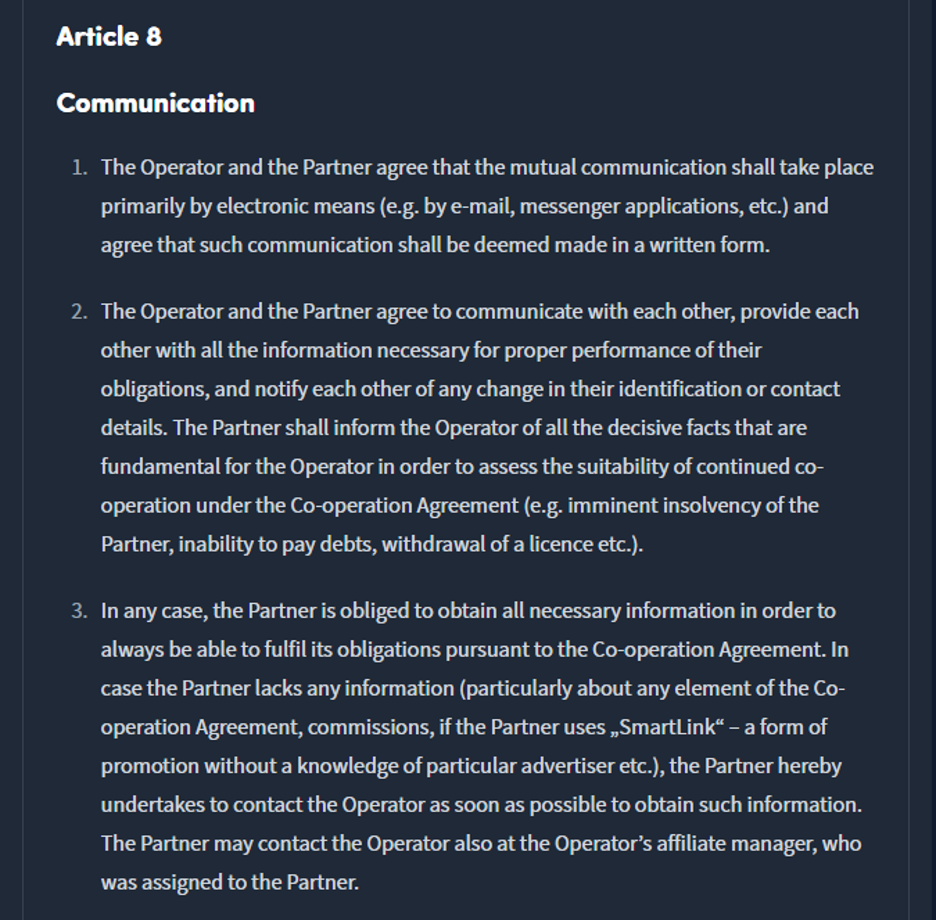
Terms of the Agreement
Use this section to clearly define causes and circumstances for suspension, duration of the contract, or any possibilities for extension. You should also stipulate premature termination, post-termination events, payment of pending commissions, and any other related matters.
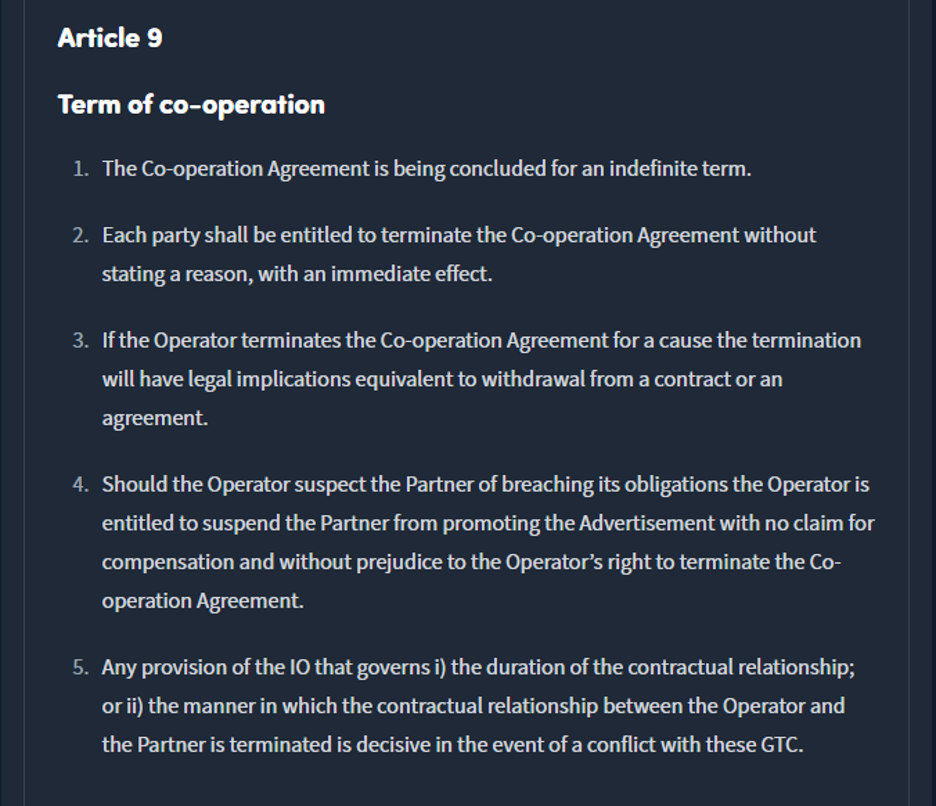
Final Provisions
The final section covers the legal stipulations applicable to your jurisdiction. In Trackdesk’s case, our agreement is governed by the laws of the Czech Republic. If an amicable settlement isn’t reached, any disputes will be settled by the Czech court system.
This section also covers any other compliance requirement imposed by governing laws in your country, such as the FTC in the United States. Working with a knowledgeable lawyer will ensure you don’t miss out on any legal stipulations.
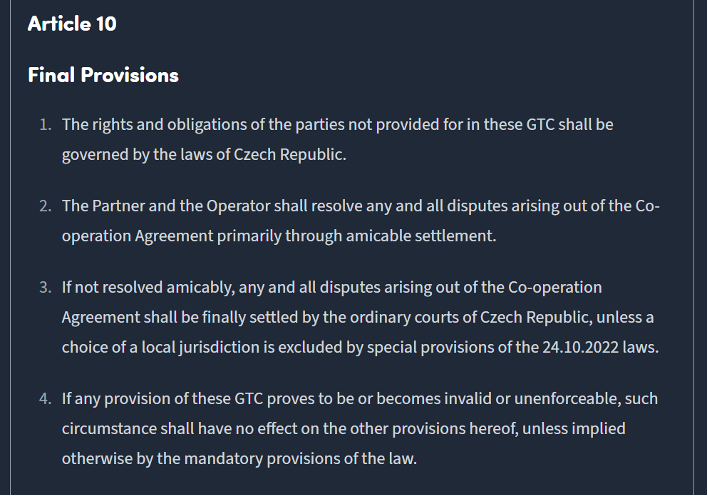
Final Thoughts
Affiliate marketing agreements are an excellent way to establish trustworthy affiliate partnerships that can last for years. Don’t go out and sign agreements made by an amateur in some back office. Hire an experienced lawyer to put together a fully binding and quality agreement that will satisfy the needs of all involved parties.
Get a copy of our affiliate agreement template to help you with the initial draft and expedite the entire process.

I have a passion for storytelling. I believe that a good story delivers value while capturing, influencing, and sustaining its intended audience. This has always been, and always will be, my primary aim as a writer.


